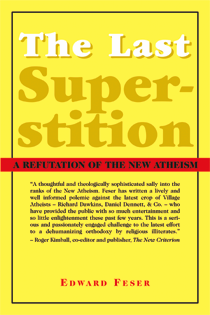I ran into a Dominican at an American Association for the Advancement of Sciences event in DC, and now I’m reading and arguing about Edward Feser‘s The Last Superstition: A Refutation of the Last Atheism with him and another brother at the priory.
This seems like a nice opportunity to explore the ‘non-nihilistic metaphysics logically require theism and probably Christianity’ pitch that I’ve gotten from plenty of Christians and more than a few atheists. Hopefully the discussion will put me in a better spot to answer Dom’s challenge. All posts about this book will be listed here, with the first one coming out Monday. And, for everyone’s convenience, since Feser spends a lot of time on Aristotle, I’ll put his summary of the Four Causes here for reference. (His quickie explanation applies all four to the example of a red rubber ball).
- Material Cause – underlying stuff that a thing is made out of, in this case rubber
- Formal Cause – the form, structure, or pattern the materal exhibits, which in this case comprises such features as sphericity, solidity, and bounciness.
- Efficient Cause – brings a thing into being, or more accurately and technically, which actualizes a potentiality in a thing; in this case that would be the actions of the workers and/or machines in the factory in which the ball was made
- Final Cause – the end, goal, purpose of a thing, in this case providing amusement to a child
Strict materialists and plenty of other people think final causes are nonexistent and/or incoherent. My posts on the topic follow below:
- Stuck in the Map Territory Gap – How can you tell whether a metaphysics is just a formalization of what you already know or a new structure to build on?
- Three Final Causes I Don’t Pray To – Even if I concede my existence is predicated on some First Mover or being that is Pure Act, does that entity have to look anything like a god?
- Futzing Around with Final Causes – Where is everyone getting this ‘inherent dignity of the body’ stuff from anyway?
- It’s Hard Out Here for a Platonist – If you’re going to take aim at a human-independent idea of math, there’s going to be a lot of collateral damage.
- The Perfection-Privation Problem – I get confused by the God-as-all-perfections- perfected idea












